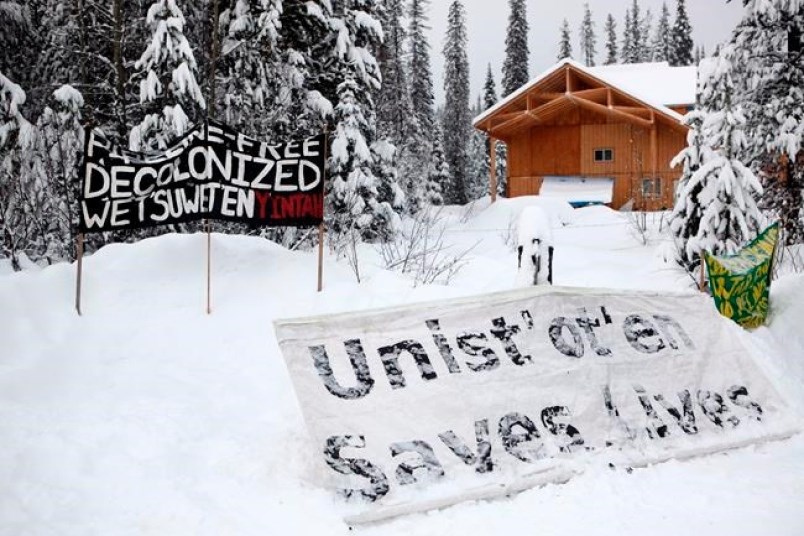Coastal GasLink is being accused of sidestepping the rightful hereditary chiefs of the West'suwet'en First Nation in its effort to win support for its plan to build a natural gas pipeline through its territory.
In a response filed last week to an application seeking an injunction against impeding the project, defendants say that after encountering opposition, the company "funded and engaged with the representatives of an extra-provincial non-profit society" called the Wet'wuwet'en Matrilineal Coalition.
"WMC includes individuals who have improperly represented themselves as hereditary chiefs and who in consequence have been reprimanded using a hereditary chiefly title or formally stripped of the claimed chiefly title," the defendants say.
Coastal GasLink has secured a temporary injunction prohibiting opponents from impeding pre-construction work on the pipeline to deliver natural gas from the B.C. Peace to the LNG Canada liquified natural gas facility planned for a site near Kitimat. Combined, the projects are worth about $40 billion.
Whether the injunction should be made permanent is to be decided at a later date. Defendants had until Feb. 20 to file a response to CGL's civil claim and application. In turn, CGL has until May 31 to file a rebuttal.
All five elected band councils within the Wet'suwet'en's traditional territory have reached benefit agreements with CGL and are in support of the project. However, the Office of the Wet'suwet'en, which represents the hereditary chiefs, say the elected council's authority stops at the edges of their respective reserves and that they have authority over the rest of the 22,000-square-kilometre territory.
Since 2010, a checkpoint has been in place at the Morice River Bridge south of Houston. It's run by the Unist'ot'en, which is affiliated with Dark House, one of three houses that make up the Gil_seyhu or Big Frog clan, one of five that make up the Office of the Wet'suwet'en.
"By funding and engaging with the WMC, CGL has attempted to sidestep Dark House, the Office of the Wet'suwet'en and the Wet'suwet'en legal process," the defendants continue and go on to say the WMC is not accountable to Wet'suwet'en governance.
The defendants also say that after encountering opposition from Dark House and other houses through the Office of the Wet'suwet'en, CGL turned to seeking information from individual Wet'suwet'en members through what it called the Intergenerational Transfer of Knowledge program rather than through the hereditary system. In doing so, CGL attempted to subvert the authority of the hereditary chiefs, the defendants say.
Defendants also say the court must take Indigenous law into account alongside common law and that the checkpoint and use of protocol questions to govern entry into the territory where pipeline construction is at particular dispute has been in compliance with Wet'suwet'en law.
"One of the firmest Wet'suwet'en laws hold that entry into any territory of any of the houses requires the permission of the head chief of that house," defendants say. "To go onto territory where permission has neither been sought nor granted is considered a serious offence."
None of the allegations have yet been tested in court.



